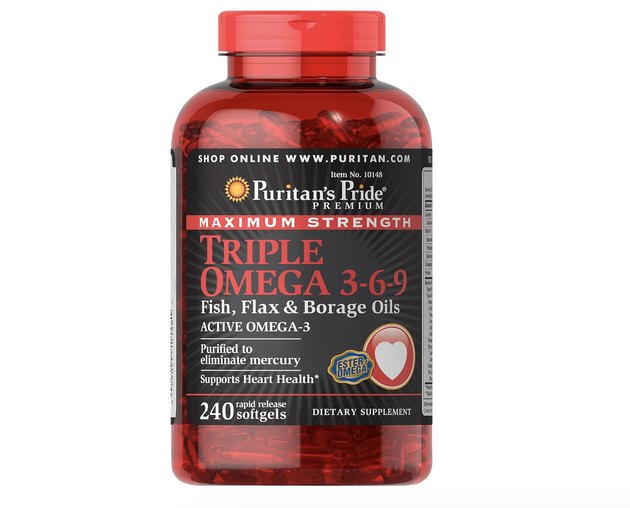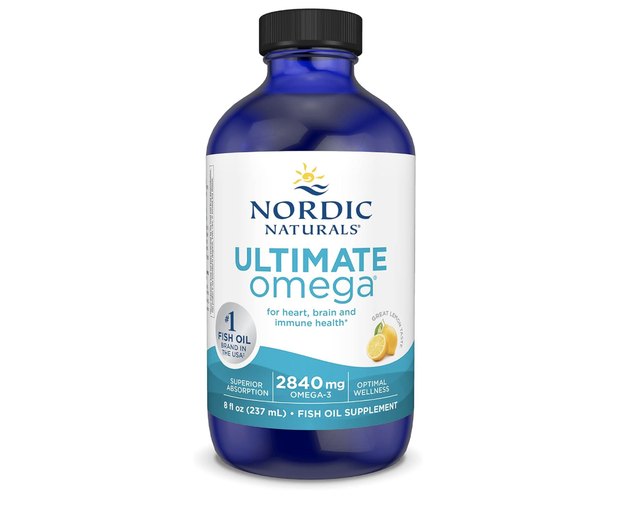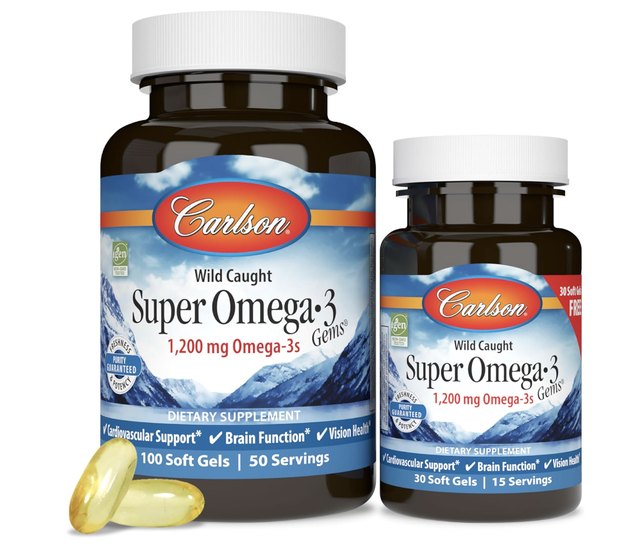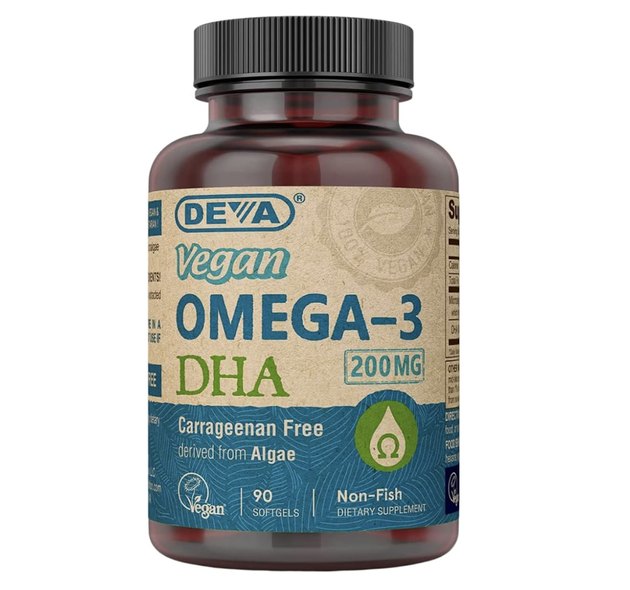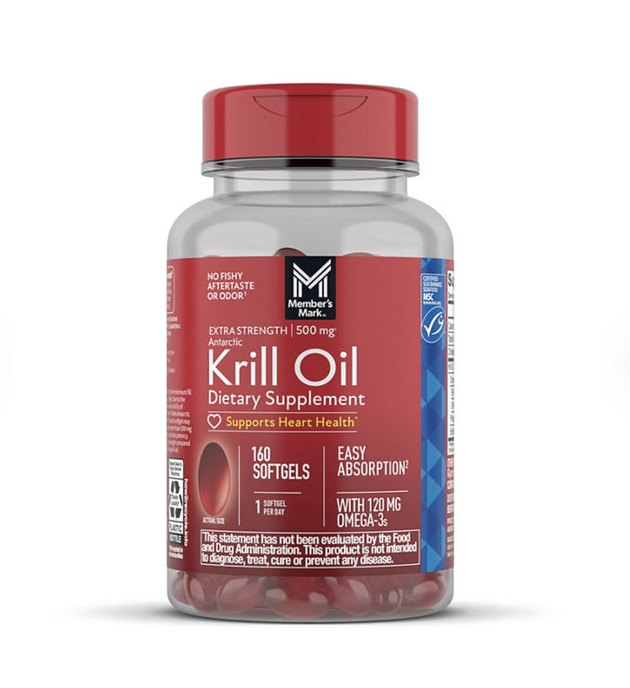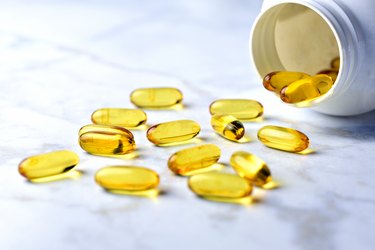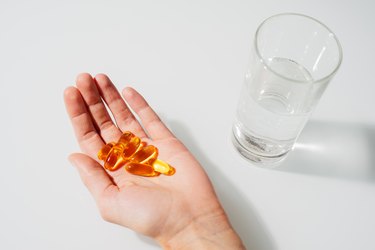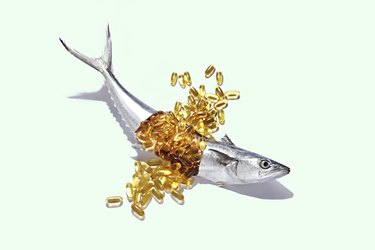
More than 90 percent of Americans don't get enough omega-3 fatty acids in their diets, according to a November 2017 study in Lipids.
That's bad news, because potential benefits of fish oil include supporting heart and brain health and lowering inflammation, says Stephanie Gray, DNP, a doctorally prepared nurse practitioner and owner of Integrative Health and Hormone Clinic in Hiawatha, Iowa.
Video of the Day
Video of the Day
If you're not eating a couple of servings of seafood a week (you should aim for 1,100 to 1,600 milligrams of omega-3 fats a day), supplements could be a smart option for you.
"Fish oil supplements are a great way to add omega-3s to your diet," Gray say. "Omega-3s are essential cornerstones of human nutrition, and are deemed essential because we need them for good health and our bodies cannot produce them on our own."
What Are Omega-3s?
In nature, omega-3s occur in three forms:
- Eicosapentaenoic acid (EPA): A long-chain fatty acid primarily found in cold-water fish that's easy for the body to absorb.
- Docosahexaenoic acid (DHA): Another long-chain fatty acid primarily found in cold-water fish. The body can make DHA from EPA.
- Alpha-linolenic acid (ALA): Found mostly in plants. "In the liver, ALA can be turned into EPA (and then into DHA), but this tends to be a slow process with conversion rates less than 15 percent," says Michael A. Smith, MD, the director of education and spokesperson at Life Extension in Fort Lauderdale, Florida.
"The body is able to slowly convert the shorter chain ALA to the more active long-chain EPA and DHA. But many people lack the enzymes necessary for this, so we should aim to get more EPA and DHA in our diets," Gray says.
Read on for the best fish oil supplements and brands on the market. As with any supplement, speak with your doctor before adding fish oil to your regimen.
Our Picks
- Best Overall: Life Extension Super Omega-3 ($28.95, Amazon)
- Best Budget-Friendly: Puritan’s Pride Triple Omega 3-6-9 ($32.99, Amazon)
- Best Liquid: Nordic Naturals Ultimate Omega Lemon Flavor ($34.99, Amazon)
- Best Sustainable: Carlson Wild Caught Super Omega-3 Gems ($31.11, Amazon)
- Best Vegan: DEVA Vegan Omega-3 DHA ($20.49, Amazon)
- Best Krill Oil: Member’s Mark Extra Strength Krill Oil ($23.48, Sam's Club)
How We Chose
The FDA doesn't regulate supplement safety and efficacy as strictly as with prescription medications. But there are Current Good Manufacturing Practices (CGMPs) for supplements, including requirements for preparation and storage.
We spoke to nutrition experts and included quality products that adhere to CGMP or have verification from independent quality control organizations, such as:
1. Best Overall Omega-3 Supplement: Life Extension Super Omega-3
Product Details
- Form: Softgel
- Dose: 4 softgels
- EPA: 700 mg
- DHA: 500 mg
- Third-party testing: Yes
2. Best Budget-Friendly Fish Oil Supplement: Puritan’s Pride Triple Omega 3-6-9
Product Details
- Form: Softgel
- Dose: 3 softgels
- EPA and DHA: 1,354 mg total
- Third-party testing: Yes
3. Best Liquid Fish Oil Supplement: Nordic Naturals Ultimate Omega Lemon Flavor
Product Details
- Form: Liquid
- Dose: 1 teaspoon
- EPA: 1,460 mg
- DHA: 1,010 mg
- Third-party testing: Yes
4. Best Sustainable Fish Oil Supplement: Carlson Wild Caught Super Omega-3 Gems
Product Details
- Form: Softgel
- Dose: 2 softgels
- EPA: 600 mg
- DHA: 400 mg
- Third-party testing: Yes
5. Best Vegan Fish Oil Supplement: DEVA Vegan Omega-3 DHA
Product Details
- Form: Softgel
- Dose: 1 softgel
- EPA: 90 - 126 mg
- DHA: 180 - 252 mg
- Third-party testing: Yes
6. Best Krill Oil Omega-3 Supplement: Member’s Mark Extra Strength Krill Oil
Product Details
- Form: Softgel
- Dose: 1 softgel
- EPA: 64 mg
- DHA: 30 mg
- Third-party testing: Yes
What to Look for in the Best Fish Oil Supplements
There are different forms of EPA and DHA in any list of fish oil supplement brands, including ethyl ester fish oil, triglyceride fish oil and phospholipid krill oil.
"All forms provide benefits and each has been independently validated in clinical studies," Dr. Smith says.
- The ethyl ester form by far has the most clinical research showing benefits, per the U.S. National Library of Medicine. It tends to be more cost-effective by providing higher concentrations of EPA and DHA per serving.
- The triglyceride form may offer a slight advantage in bioavailability over the ethyl ester form, but over time both have been found to be well-absorbed, per a July 2010 study in Prostaglandins Leukotrienes and Essential Fatty Acids.
- Krill oil provides both the triglyceride and phospholipid forms of EPA and DHA. Krill's unique phospholipid form can help encourage more effective transport of omega-3 fats in the body. The phospholipid form of DHA shows more rapid uptake into the brain, per a November 2015 study in Lipids in Health and Disease. But, krill oil contains a lower percentage of EPA and DHA compared to the same amount found in fish oil, which can make obtaining higher potencies more costly with krill oil, per a separate August 2011 study in Lipids in Health and Disease.
The best fish oil supplements are sourced from small fish, like sardines and anchovies, because they tend to contain lower levels of heavy metals like mercury, Gray explains.
"I typically start my patients with 1 to 2 grams, or 1,000 to 2,000 milligrams, per day of a combined EPA and DHA," Gray says. Then, she performs blood tests throughout the following months to monitor their progress.
Labels to Look For
To highlight the best fish oil supplements you can buy, we referred to ConsumerLab's omega-3 supplement review. The USP seal is also a mark of a safe, high-quality supplement.
Another indicator of a quality fish oil supplement is a 5-star rating from International Fish Oil Standards (IFOS), which can be found as a seal on the bottle. IFOS is a third-party testing organization that rates fish oil quality.
Five stars is the highest rating given for purity, potency and freshness, and it means the supplement has passed tests regarding rancidity (oxidation), potency, pollutants (heavy metals, dioxins, furans and PCBs) and radiation.
COA for Fish Oil Supplements
You can also reach out to the company to request a certificate of analysis (COA), Dr. Smith says.
"A COA is the analysis of the finished product that tests for purity and potency. It provides proof that the label is accurate for potency and what is in the bottle is not contaminated with microbes or heavy metals. Reputable companies will test each batch, so be sure to look for the lot number on the COA," he says.
What Are the Benefits of Omega-3 Supplements?
"Supplementing with high doses of EPA and DHA have been linked to improvements in heart and brain health, lower levels of inflammation and better joint mobility," Dr. Smith says.
"The ideal omega-6 to omega-3 ratio is as close to 1:1 as possible. Unfortunately, with modern American diets, this is extremely difficult to achieve even with supplementation. About 100 years ago, it's estimated that Americans had anywhere between a 3:1 to 5:1 omega-6 to omega-3 ratio," Gray explains. "Today, it's estimated that we are looking at a 15 to 25:1 omega-6 to omega-3 ratio."
This is likely because omega-6 oils, such as soybean, cottonseed, corn and canola oils, are the most used vegetable oils in the U.S. as they have a longer shelf life than omega-3 oils, per the Harvard T.H. Chan School of Public Health.
On top of all the potential omega-3 benefits listed above, Gray says that the best fish oil supplements have been linked to improvements in:
- Cholesterol
- Blood sugar levels
- Mental health
- Memory
- Pain
- Inflammation-related skin conditions, such as psoriasis, eczema and acne
- Chronic headaches
- Menstrual cramps
Tip
To preserve their quality for as long as possible, store omega-3 supplements away from sources of heat and light. Once open, you may want to refrigerate your fish oil supplements.
Who Should Avoid Omega-3 Supplements
Anyone with allergies to the specific fish oil in the omega-3 supplement should steer clear.
Although generally safe, overdoing it on omega-3s (particularly EPA and DHA) might suppress the immune system, according to the Mayo Clinic.
Those with low blood pressure may want to be particularly careful as well, because supplementation may lower blood pressure even more. People with any bleeding disorders should talk to a hematologist — omega-3s are generally contraindicated.
Stop taking any omega-3s one week before any procedure or surgery to reduce the risk of bleeding.
FAQ
Common Questions
How much fish oil per day is safe?
Stick to 5 grams or less of fish oil per day unless advised otherwise by your doctor. The most common side effect is a fishy aftertaste or fish-tasting burps, per the Office of Dietary Supplements. An enteric-coated formula or taking an omega-3 supplement alongside a meal may help you avoid this.
“Children, pregnant and breastfeeding people should only take fish oil under a doctor's supervision,” Dr. Smith adds.
What is the best time to take fish oil?
Taking fish oil at mealtime may help you avoid a fishy aftertaste or fish-tasting burps. That can be any time you're eating, though. Try to take it at the same time every day, per the Cleveland Clinic.
Are fish oil gummies or pills better?
Gummy versions of most vitamins and supplements generally contain less of the nutrients in question and more sugar, according to the Cleveland Clinic. You're more likely to get the benefits you're looking for from a pill or liquid.
- Lipids: "Total Long-Chain n-3 Fatty Acid Intake and Food Sources in the United States Compared to Recommended Intakes: NHANES 2003-2008"
- Harvard T.H. Chan School of Public Health: "Ask the Expert: Concerns about canola oil"
- Mayo Clinic: "Fish Oil"
- Mayo Clinic: "Drugs and Supplements: Omega-3 (Oral Route)"
- NLM: "Clinical Trials for Lovaza"
- ODS: "Omega-3 Fatty Acids"
- Lipids in Health and Disease: "Incorporation of EPA and DHA into plasma phospholipids in response to different omega-3 fatty acid formulations - a comparative bioavailability study of fish oil vs. krill oil"
- Prostaglandins Leukotrienes and Essential Fatty Acids: "Bioavailability of marine n-3 fatty acid formulations"
- Lipids in Health and Disease: "Supplementation of krill oil with high phospholipid content increases sum of EPA and DHA in erythrocytes compared with low phospholipid krill oil"
- Cleveland Clinic: "Fish Oil, Omega-3 Fatty Acids Capsules (Rx)"
- Cleveland Clinic: "Do Gummy Vitamins Work as Well as Traditional Vitamins?"

